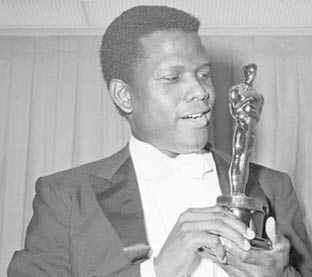First black man to win best actor, Oscar, dies at 94
Actor Sidney Poitier, who broke racial barriers with his love interests in Hollywood, has died at 94. Sidney Poitier, was a trailblazer for Hollywood diversity and a Presidential Medal of Freedom recipient. Poitier died Thursday in the Bahamas, acting Director General of the Ministry of Foreign Affairs in the Bahamas, Eugene Torchon-Newry, confirmed to Associated […]

Sidney Poitier
Actor Sidney Poitier, who broke racial barriers with his love interests in Hollywood, has died at 94.
Sidney Poitier, was a trailblazer for Hollywood diversity and a Presidential Medal of Freedom recipient.
Poitier died Thursday in the Bahamas, acting Director General of the Ministry of Foreign Affairs in the Bahamas, Eugene Torchon-Newry, confirmed to Associated Press.
Poitier’s legacy in film history is that of an icon. Many of his most memorable roles deal with race in mainstream Hollywood films before others opted to do so. One biographer dubbed him the “Martin Luther King of the movies”.
The 1967 film, “Guess Who’s Coming to Dinner”, in which Poitier starred in as the love interest opposite Katharine Houghton, offered a positive depiction of interracial couples during a time when more than a handful of states still had laws prohibiting interracial marriage.
“Before Sidney, African American actors had to take supporting roles in major studio films that were easy to cut out in certain parts of the country. But you couldn’t cut Sidney Poitier out of a Sidney Poitier picture,” Denzel Washington said at the 2002 Academy Awards, presenting Poitier with an honorary Oscar. “He was the reason a movie got made: the first solo, above-the-title African American movie star.”
Sidney Poitier was the first Black man to win a best actor Academy Award. Among his long list of accolades, Poitier became the first African American actor to be nominated for an Academy Award for best actor (for “The Defiant Ones” in 1958) and six years later became the first Black man to win an Academy Award for best actor, this time for “Lilies of the Field.”
In Poiter’s acceptance speech, he acknowledged the “long journey to this moment” and said he was “indebted to countless numbers of people” including the members of the Academy. Through overwhelmed breaths and big smiles, he ended: “All I can say is a very special thank you.
